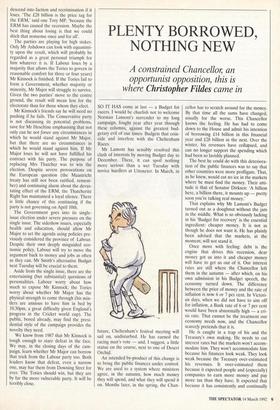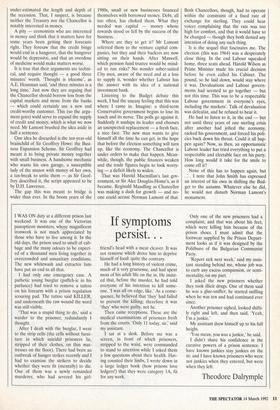PLENTY BORROWED, NOTHING NEW
A constrained Chancellor, an opportunist opposition, this is
where Christopher Fildes came in
SO IT HAS come at last — a Budget for racers. I would be churlish not to welcome Norman Lamont's surrender to my long campaign, fought year after year through these columns, against the greatest bud- getary evil of our times: Budgets that coin- cide and interfere with the Cheltenham Races.
Mr Lamont has sensibly resolved this clash of interests by moving Budget day to December. There, it can spoil nothing more serious than a wet Tuesday with novice hurdlers at Uttoxeter. In March, in future, Cheltenham's festival meeting will sail on, undisturbed. He has earned the racing man's vote — and, I suggest, a little statue on the course, next to one of Desert Orchid.
An intended by-product of this change is to bring the public finances under control. We are used to a system where ministers agree, in the autumn, how much money they will spend, and what they will spend it on. Months later, in the spring, the Chan- cellor has to scratch around for the money. By that time all the sums have changed, usually for the worse. This Chancellor knows the feeling. He has had to come down to the House and admit his intention of borrowing £14 billion in this financial year and £28 billion in the next. Over the winter, his revenues have collapsed, and can no longer support the spending which had been so lavishly planned.
The best he could do with this deteriora- tion of the public finances was to say that other countries were more profligate. That, as he knew, would cut no ice in the markets where he must find the money. Their atti- tude is that of Senator Dirksen: 'A billion here, a billion there, it mounts up — pretty soon you're talking real money.'
That explains why Mr Lamont's Budget turned out as a doughnut without the jam in the middle. What is so obviously lacking in his 'Budget for recovery' is the essential ingredient: cheaper money. It is not as though he does not want it. He has plainly been advised that the markets, at the moment, will not stand it.
Once more with feeling: debt is the engine that drives this recession, dear money got us into it and cheaper money will have to get us out of it. Our interest rates are still where the Chancellor left them in the autumn — after which, on his own admission in his Budget speech, the economy turned down. The difference between the price of money and the rate of inflation is now 6 or 7 per cent. In Victori- an days, when we did not have to aim off for inflation, a Bank rate of 6 or 7 per cent would have been abnormally high — a cri- sis rate. That cannot be the treatment our economy needs now, and the Chancellor scarcely pretends that it is.
He is caught in a trap of his and the Treasury's own making. He needs to cut interest rates but the markets won't accom- modate him. They won't accommodate him because his finances look weak. They look weak .because the Treasury over-estimated his revenues, It over-estimated them because it expected people and (especially) companies to earn more money and pay more tax than they have. It expected that because it has consistently and continually under-estimated the length and depth of the recession. That, I suspect, is because neither the Treasury nor the Chancellor is notably interested in money.
A pity — economists who are interested in money and think that it matters have for some years been getting their forecasts right. They foresaw that the credit binge would end in a hangover, that the hangover would be depressive, and that an overdose of medicine would make matters worse.
It is true that their arguments are techni- cal, and require thought — a good three minutes' worth. 'Thought is irksome', as A.E. Housman said, 'and three minutes is a long time.' Just now they are arguing that the Chancellor should borrow less from the capital markets and more from the banks — which could certainly use a new and credit-worthy customer. This (so the argu- ment goes) wuld serve to expand the supply of credit and money, which is what we now need. Mr Lamont brushed the idea aside in half a sentence.
One idea he discarded is the ten-year-old brainchild of Sir Geoffrey Howe: the Busi- ness Expansion Scheme. Sir Geoffrey had meant it to bring private money together with small business. A handsome mechanic who wants his own garage, a susceptible lady of the manor with money of her own, a tax-break to unite them — as Sir Geof- frey described it, the script appeared to be by D.H. Lawrence.
The gap this was meant to bridge is wider than ever. In the boom years of the 1980s, small or new businesses financed themselves with borrowed money. Debt, all too often, has choked them. What they needed was capital — money whose rewards stood or fell by the success of the business.
Where are they to get it? Mr Lamont referred them to the venture capital com- panies, but they and their backers are now sitting on their hands. After Maxwell, which pension fund trustee would be mind- ed to run risks? No wonder sober-suited City men, aware of the need and at a loss to supply it, wonder whether Labour has the answer with its idea of a national investment bank.
Listening to the Budget debate this week, I had the uneasy feeling that this was where I came in. Imagine: a third-term Conservative government begins to lose its touch and its nerve. The polls go against it. Suddenly it unships its leader and chooses an unexpected replacement — a fresh face, a nice face. The new man wants to give himself all the time he can get, in the hope that before the election something will turn up, like the economy. The Chancellor is under orders to make that happen. Mean- while, though, the public finances weaken and the trade figures begin to look worry- ing — a deficit likely to widen.
That was Harold Macmillan's last gov- ernment, or Sir Alec Douglas7Home's, as it became. Reginald Maudling as Chancellor was making a dash for growth — and no- one could accuse Norman Lamont of that. Both Chancellors, though, had to operate within the constraint of a fixed rate of exchange for sterling. They could hear voices complaining that the rate was too high for comfort, and that it would have to be changed — though they both denied any intention of doing any such thing.
It is the sequel that fascinates me. The election (this was 1964) was a desperately close thing. In the end Labour squeaked home, three seats ahead. Harold Wilson as Prime Minister made his crucial decision before he even called his Cabinet. The pound, so he laid down, would stay where it was. Devaluations and Labour govern- ments had seemed to go together — but not this time. This was to be a respectable Labour government in everyone's eyes, including the markets'. Talk of devaluation was defeatist, and he refused to hear it.
He had to listen to it, in the end — but not until three years of one sterling crisis after another had jolted the economy, racked his government, and forced his poli- cies back down his throat. Could it all hap- pen again? Now, as then, an opportunistic Labour leader has tried everything to put a respectable and electable face on his party. How long would it take for the smile to come off it?
None of this has to happen again, but . : . I note that John Smith has expressed an interest of his own in shifting the Bud- get to the autumn. Whatever else he did, he would not disturb Norman Lamont's monument.



























































 Previous page
Previous page